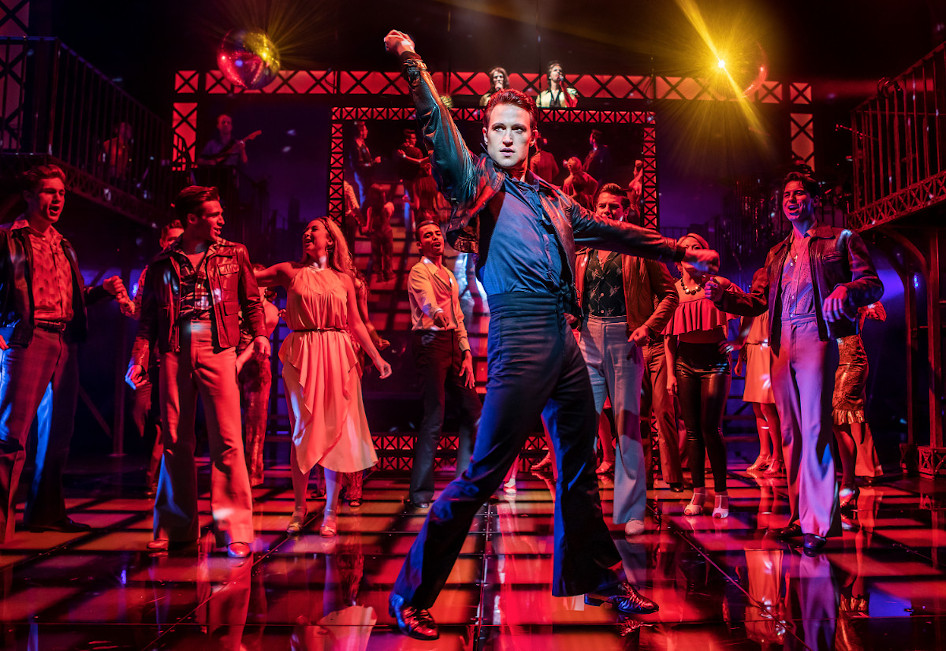
The spirit of the 1970s comes to the stage with Saturday Night Fever. Richard Winsor dons a tight shirt and flared trousers to embody Tony Manero, the local dancing idol of his poor Brooklyn neighbourhood. Accompanied by live performances of ‘70s disco hits, dancing and drama abound.
The music is of course the main draw for most of the audience. That and seeing the main stars gyrate around in tight flattering outfits. The classic disco hits are performed live by the band and three figures emulating the Bee Gees from on high. It adds yet more bombast to the impressive and energetic dancing that the story is framed around.
One minor quirk is the bizarre intermingling of diegetic and non-diegetic musical numbers. The majority of tunes are contextualised as tracks that the characters are actually dancing to at the disco, but around this we have a handful of songs performed by the characters. It’s a minor qualm but it comes across as though the show hasn’t quite committed to being a full-throated musical.
For all the swagger and strutting, the core of the story remains grimy and dark. Dancing and the polished veneer of the discotheque are an escape from social deprivation in Brooklyn. Tony Manero is stuck in a dead-end job, supporting an alcoholic dead-beat father and the rest of his family, his friends are hopeless, the streets are rife with racial tension and he has no education to speak off. Even the only socially mobile character in the piece, Stephanie, is incredibly anxious about how her lack of a background puts her at a great disadvantage. The set is transported to the discotheque by exuberant lighting and music, otherwise it is a cage composed of grotty fire escapes.
The show actually walks a fine line with some of these social details. There’s some grotesque behaviour and many of the characters are steeped in machismo, misogyny and bigotry. It’s all period accurate and in the end I think they have managed to present these things sensibly in context: the characters are blasé about these attitudes but the isolated blocking or an unsympathetic split-second pause do add a layer of criticism.
Though Tony’s arc is a good way to explore these environs and his slow realisation that he wants to leave Brooklyn behind, some of the surrounding characters do come across a little flat. Bobby C is interminably desperate and depressed, Annette is a chasing validation from start to end, Tony’s father is a constant unemployed drunk, etc. These characters have definable traits but no depth or development. Perhaps it is the point: that the world around Tony is crap and static. Nevertheless, some of these characters do drive the plot through their interactions with Tony and appear two-dimensional when they come into focus.
Despite the peripheral cast being underdeveloped for their roles, Winsor as Tony and Olivia Fines as Stephanie more than carry the drama. It can be a little jarring to contrast the bubbly disco tunes with how dark the material is but it’s that tension that is the core of Saturday Night Fever and makes it an engaging show. ★★★★☆ Fenton Coulthurst 25th September 2019

